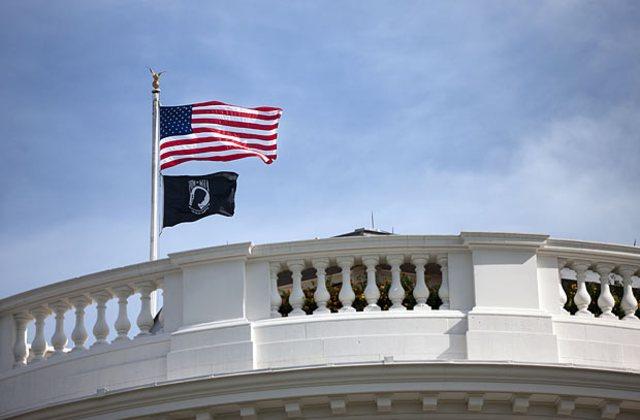
Collusion by the White House, the Pentagon, and the mainstream media resulted in disparagement, denial, and suppression of eyewitness testimony confirming that most POWs were actually well-treated by their North Vietnamese captors (in contrast to the brutal torture and death often meted out to North Vietnamese POWs by U.S. forces).
When numerous U.S. POWs began to understand the truth about the war they had been fighting, they spoke out against it—voluntarily—as an act of conscience. But they were cynically portrayed as traitors, turncoats and “camp rats,” their reputations and lives destroyed, driving many to despair and even suicide.
Among the few memories that most Americans still retain of the Vietnam War—now nearly 60 years in the past—one of the most vivid centers around the torture suffered by Senator John McCain at the hands of his brutal Vietnamese captors while a prisoner of war in Hanoi’s Hoa Lo prison (AKA The Hanoi Hilton).
This story has been told, retold, and continually burnished countless times by admiring media interviews and a flood of books and memoirs, including several by McCain himself.
Another memory of the war, still believed by millions of Americans, is that hundreds or even thousands of American soldiers classified as MIA (Missing in Action) are actually being held and tortured in secret North Vietnamese POW camps, callously abandoned by our government and desperately praying to be rescued—preferably in a Hollywood-style rescue by Chuck Norris or Sylvester Stallone, who starred in the spate of Commie-hating blockbuster movies inspired by their plight.
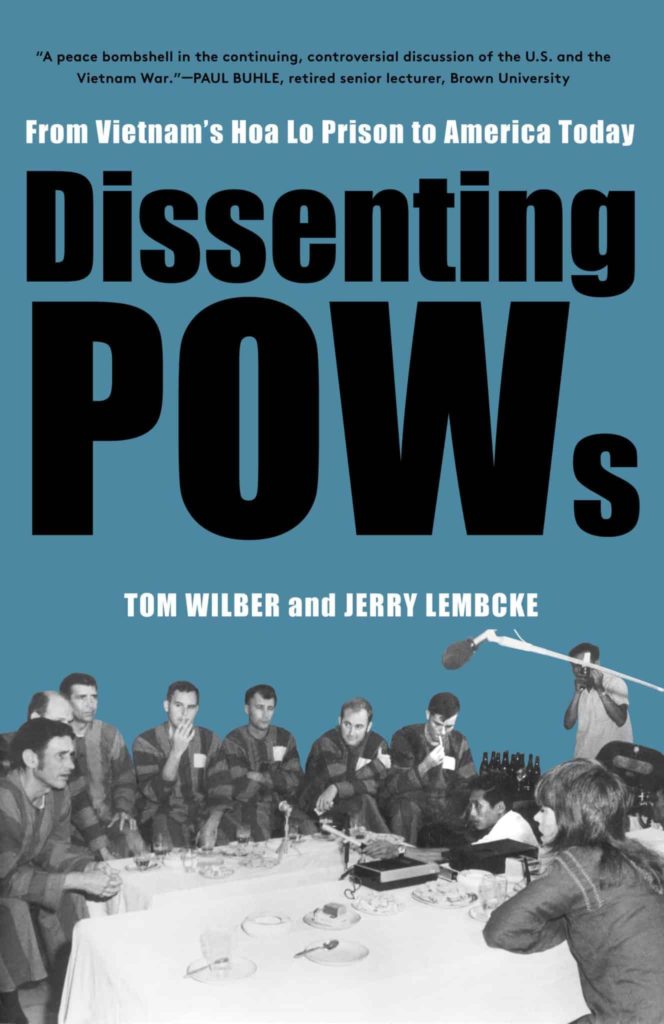
This belief is continually reinforced by POW/MIA flags which fly at every post office, and a ready supply of new books and movies, such as the 2018 release of the film M.I.A. A Greater Evil.
But both memories of the Vietnam War are false memories. However passionately believed, they were cynically manufactured fantasies implanted in all-too-willing American minds for political purposes.
How and why these counter-factual beliefs were so successfully foisted on the American public is the subject of the new myth-shattering book by Tom Wilber and Jerry Lembcke, Dissenting POWs: From Vietnam’s Hoa Lo Prison to America Today (New York: Monthly Review Press, 2021).
Wilber is the son of a dissenting POW, Walter “Gene” Wilber, who is featured in the book, and has contributed to the award-winning documentary film The Flower Pot Story by Ngọc Dũng. Lembcke is a distinguished sociologist from College of the Holy Cross who has written a number of books debunking popular myths about the Vietnam War.
The two start their book by noting that the dominant war hero image of the POW—who endured torture and resisted service to enemy propaganda—was to a large extent created by high-ranking men like McCain who were captured early in the conflict.
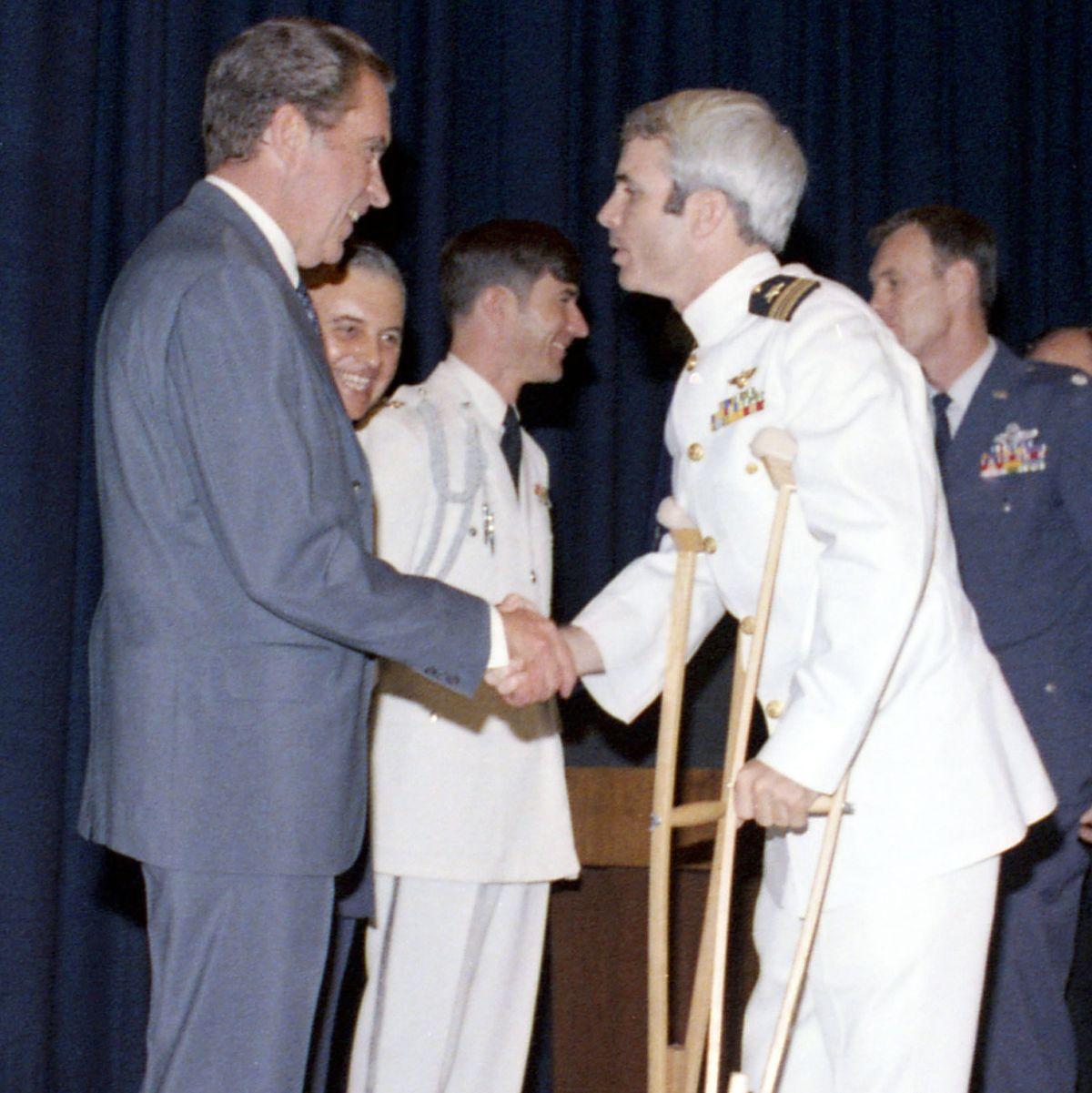
McCain’s oft-told story of ill-treatment and torture is contradicted by Nguyen Tien Tran, the chief prison guard of the jail in which McCain was held. In a report by The Guardian, “[Tran] acknowledged that conditions in the prison were ‘tough, though not inhuman’. But, he added: ‘We never tortured McCain. On the contrary, we saved his life, curing him with extremely valuable medicines that at times were not available to our own wounded’. . . . [H]e denied torturing him, saying it was his mission to ensure that McCain survived. As the son of the US naval commander in Vietnam, he offered a potential valuable propaganda weapon.”
Most of the others promoting a heroized image of U.S. POW’s were graduates of service academies and came from privileged backgrounds. They included a) James Stockdale, who ran for Vice President in 1992 as the running mate of Ross Perot; b) Robinson Risner, a double recipient of the Air Force Cross, the second highest military decoration for valor; and c) Jeremiah Denton, who went on to become the first Republican Senator from the state of Alabama and a close ally of President Ronald Reagan.
John McCain fit well with this group because he was also academically privileged and his family included high-ranking military officers like his father, Jack, who was an admiral and the Commander of the U.S. Pacific Command.
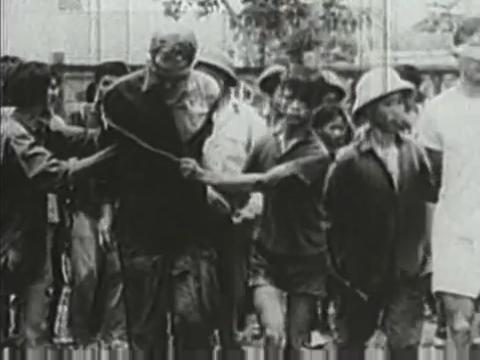
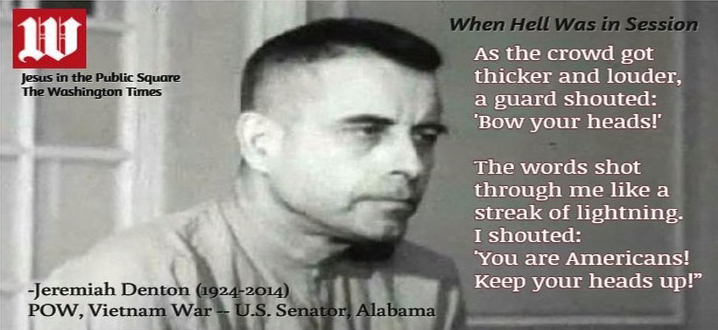
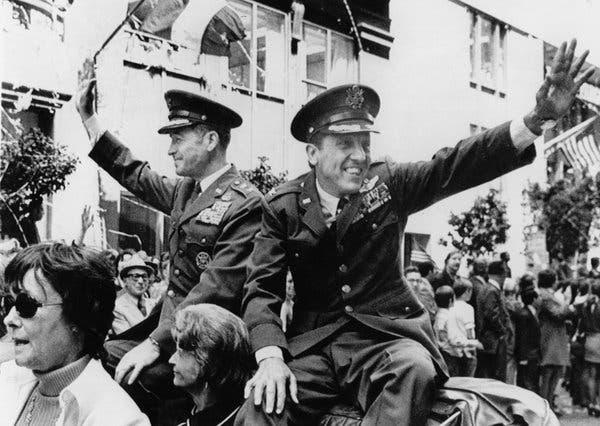
With post-war military careers at stake, these high-ranking officers played up the alleged barbarity of the North Vietnamese, demanded resistance to interrogations from other captives, and threatened so-called deviants with disciplinary charges after release to the U.S.
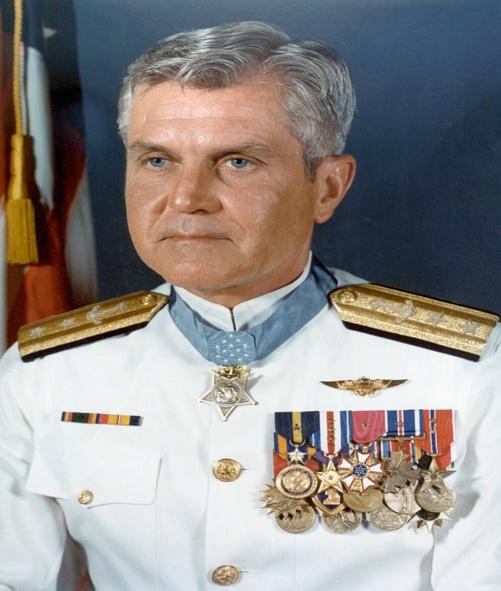
James Stockdale [Source: wikipedia.com] 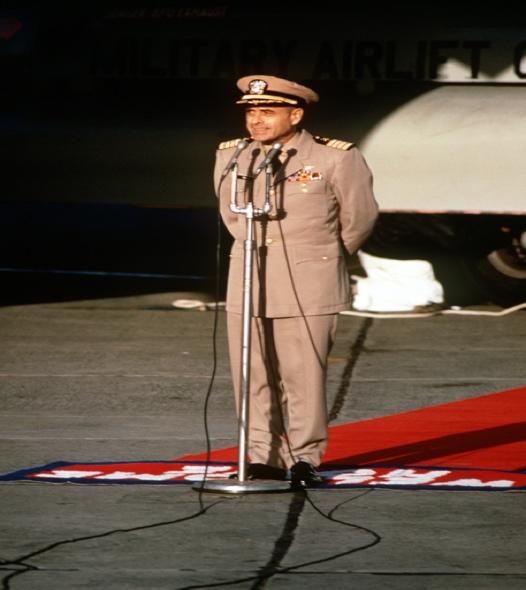
Jeremiah Denton [Source: wikipedia.org]
The Nixon administration advanced their credibility and status in a desperate ploy to stir up support at home for an unpopular conflict abroad; and further concocted a story—announced in a press conference by Defense Secretary Melvin Laird on May 19, 1969—that 1,300 American soldiers deemed “missing in action” were believed to be prisoners of war.
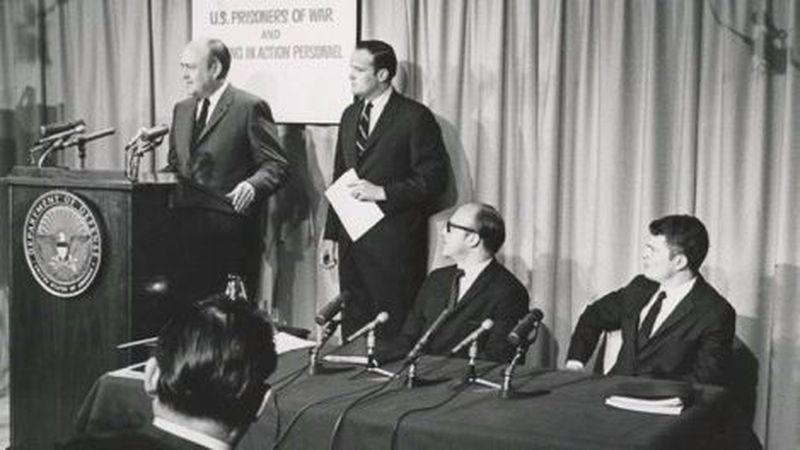
The unaccounted for would now publicly be described as “POW/MIA,” implying that any serviceperson missing in Vietnam could also be a prisoner of war. This transformed the war from a political issue into a humanitarian one, trading public support for sympathy. It didn’t matter why we were there in the first place: Our boys were there, and by God were we going to do anything to get them home.
Suddenly, the public image of Vietnam looked very different. The very real footage of brutalized Vietnamese bodies, wailing children, and napalmed villages was traded for a fantasy—all of the violence that had been done in Uncle Sam’s name was now being done to him.
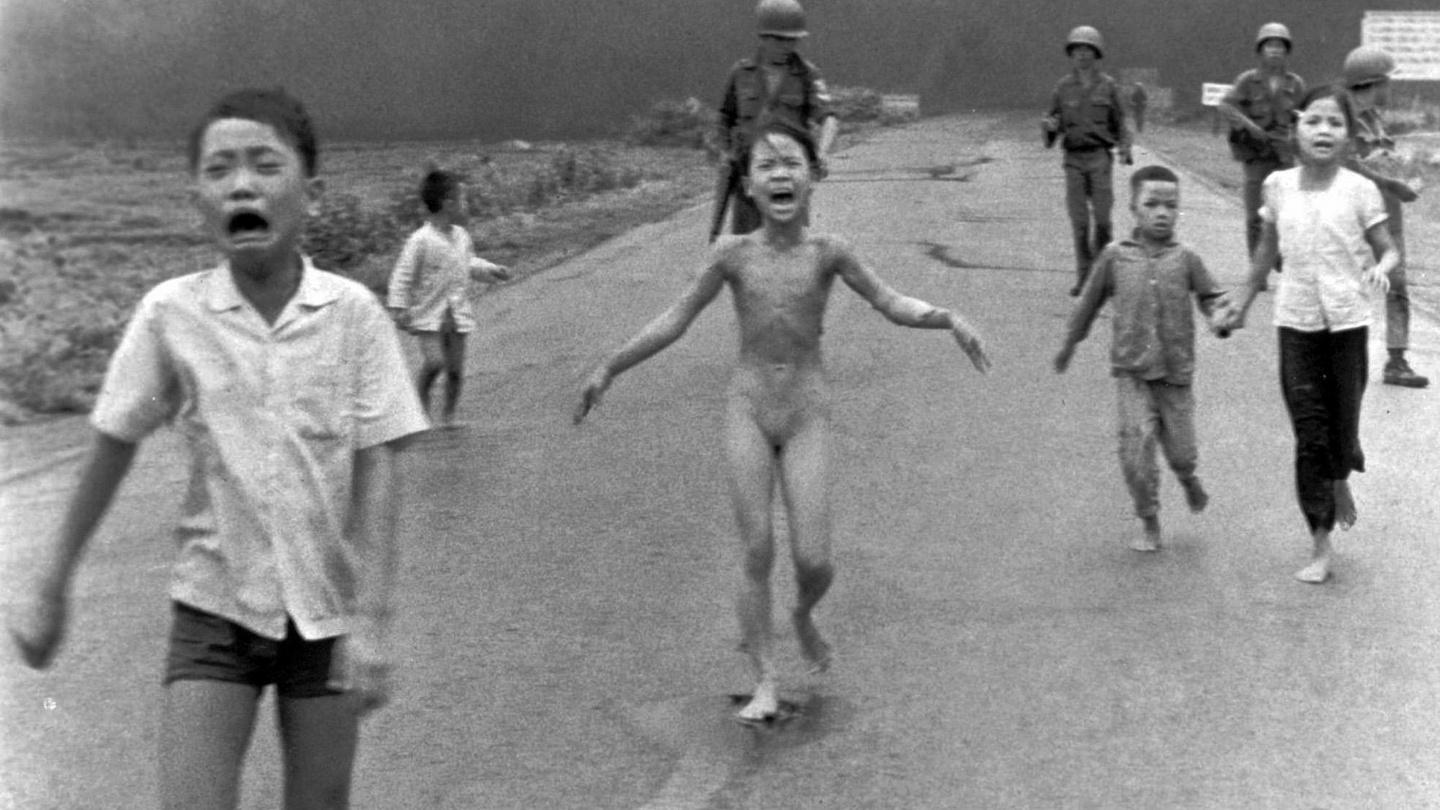
The POW issue soon became a cause célèbre. In the early 1970s, millions of “POW bracelets” were sold by a student group called VIVA (Voices in Vital America), each branded with the name of a missing American serviceman.
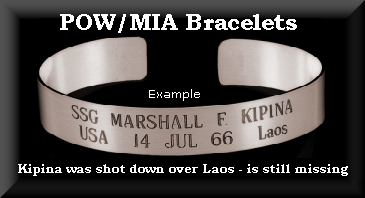
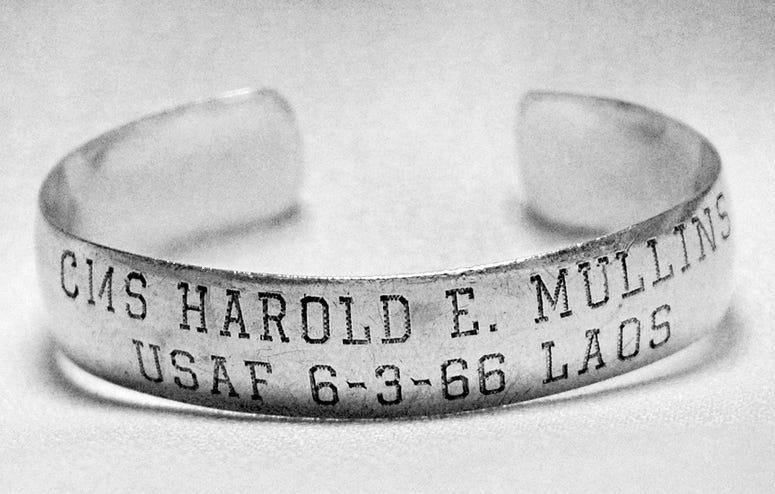
These shiny nickel bracelets were spotted on the wrists of celebrities like Sonny and Cher—who had often before dressed like hippies—and Sammy Davis, Jr, and allegedly Princess Grace of Monaco put in an order for two bracelets.
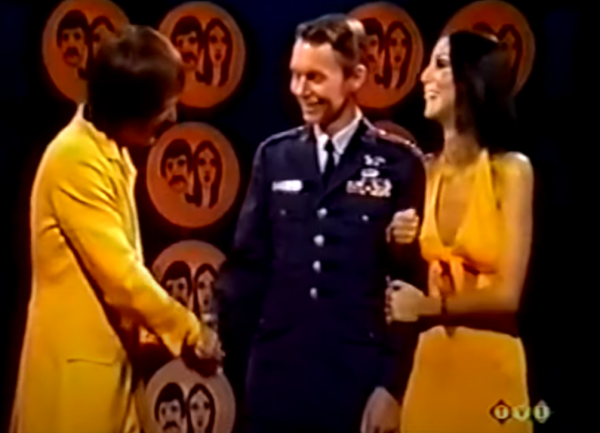
The silver bracelets could even be spotted on the fashion runway, where models with an interest in political activism took to wearing them. A New York Times profile from the day quotes a model named Astrida Woods, who said she was “dissatisfied” with her life as a model and felt the urge to give back. “I began to do some work with Ralph Nader, and now [wearing the bracelets]. It’s a way to contribute something.”

Many U.S. GIs and pilots, however, reported being humanely treated during their captivity, with access to adequate food, recreation facilities and reading material.
Wilber and Lembcke conclude that “instances of brutal treatment” were “less common than [has been] purported” and that evidence of systematic torture drawn from visitor reports, POW statements, and oral histories was scant.
Those POWs who questioned the war were dismissed by the military for their supposedly “weak personal character” and “lack of education and backgrounds in broken and poor families,” a typical case of “psychologizing the political.”
These men were in turn stigmatized and then forgotten by the public amidst the manufactured concern about POW/MIAs who were supposedly brutalized and then kept in captivity and abandoned by their government.
Camp Rats?
The ranks of the POW dissenters included Lt. Col. Edison Miller, a recipient of the Distinguished Flying Cross and Purple Heart from California who spent six years in captivity after his fighter plane was shot down over North Vietnamese skies on October 13, 1967.
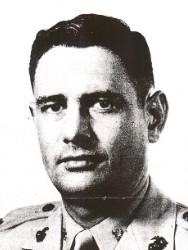
A contemporary described Miller, a Californian who flew previously over Korea, as a “first-rate pilot with a zeal for combat but an independent sort.”
John McCain falsely accused Miller of being a turncoat because he appeared in North Vietnamese propaganda.
In his 1999 best-selling book Faith of My Fathers, McCain wrote about Miller as one of two “camp rats”—the other being Tom’s father Gene, who had been executive officer of a squadron of F-4s when he was shot down over North Vietnam on June 16, 1968.
McCain said both “had lost their faith completely.”
“They not only stopped resisting but apparently crossed a line no other prisoner I knew had even approached,” McCain wrote. “They were collaborators, actively aiding the enemy.”
Miller told the Orange County Register in response to these charges that McCain had “lied about me … The attacks on my character and integrity are totally without merit or justification. I did stand up and say the war was wrong. I would speak against the war, but I never spoke against my country. And I gave up no secrets.”
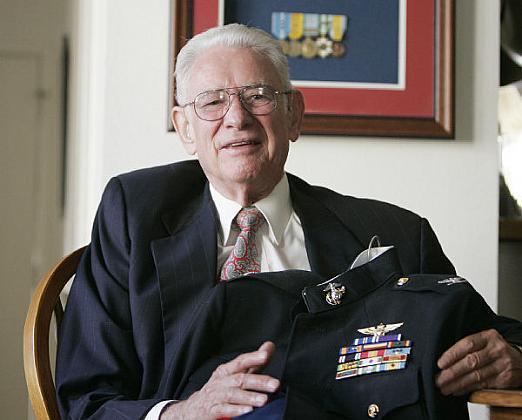
McCain accused Miller of receiving eggs, bananas and other delicacies to eat from camp guards. Miller says, however, that he never saw eggs during his internment and that McCain was never in a position to see the food brought to him.
McCain further claimed that Miller turned him in to a North Vietnamese guard when McCain tried to befriend him, and that the guard then beat McCain. Miller said: “I never ratted out a fellow American. McCain has fabricated and exaggerated his experience for political advantage.”
Miller’s anti-war views had been sharpened in conversation with Navy Commander Robert Schweitzer, a captive from 1968 to 1973 who died a year after his release while still on active duty in San Francisco.
Schweitzer felt that, because the U.S. had never declared war, there could not legally be any North Vietnamese prisoners of war, only “Americans detained by a foreign power,” Miller said.
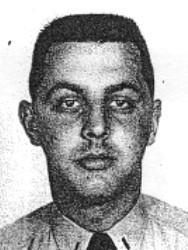
A tape of a conversation between Miller and Schweitzer was played for other prisoners, who heard not only an anti-war message but a challenge to the legality of the U.S. military action in Vietnam.
In 1970, when Schweitzer and Gene Wilber were interviewed on national television, Wilber called for an immediate U.S. troop withdrawal “so that the Vietnamese can solve their own problems.”
U.S. journalists at the time, however, did not take their interview seriously, regarding it rather as a North Vietnamese propaganda show.
Wilber and Miller nevertheless continued to write protest statements and together with fellow dissenters met with American peace activists visiting North Vietnam, including actress Jane Fonda and former U.S. Attorney General Ramsey Clark.
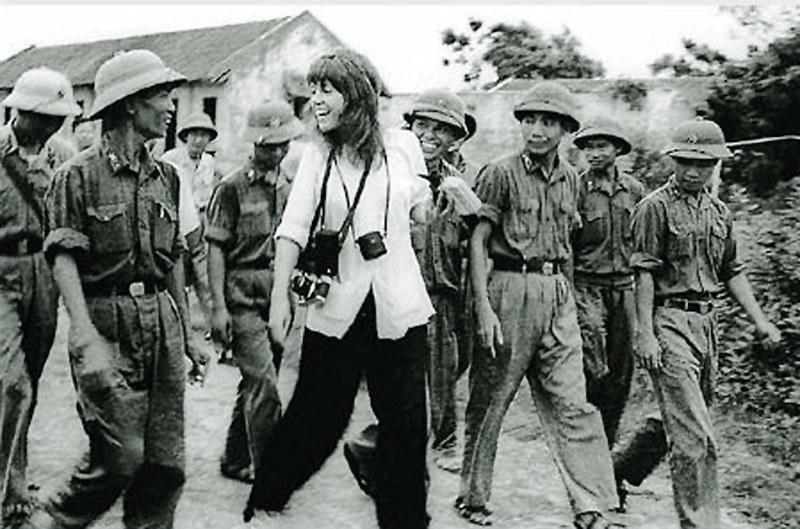
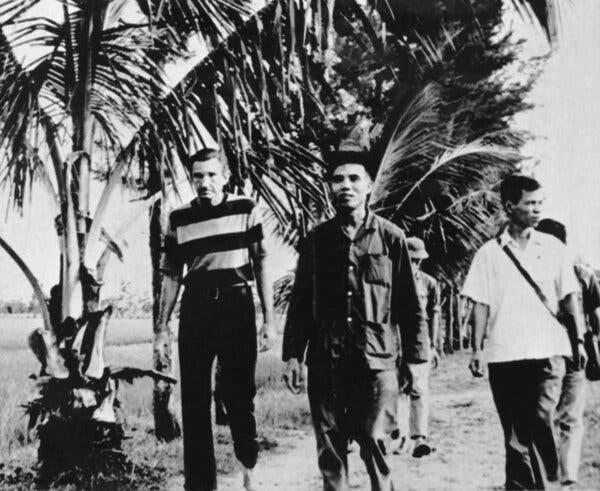
Empathy for the War’s Victims
Most dissenting POWs came from a working-class background.
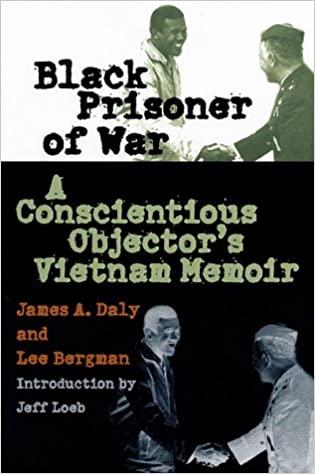
James A. Daly, an African-American infantryman from the Bedford-Stuyvesant section of Brooklyn, for example, was raised in poverty by a single mother.
His 1975 book, Black Prisoner of War, describes his three years of jungle confinement after his capture by North Vietnamese soldiers and the South Vietnam-based National Liberation Front (NLF), followed by a two-month trek north to Hanoi on the Ho Chi Minh trail where he experienced what it was like to be on the receiving end of U.S. ordnance.
Bob Chenoweth, from a white working-class family in Oregon, similarly developed an empathy for the Vietnamese people and a distaste for the racist views of most Americans toward the Vietnamese.
A helicopter crew member, before he was shot down and captured, Chenoweth said he “couldn’t see how U.S. forces could possibly be helping the Vietnamese given the attitude that GIs had, viewing them as ‘subhuman’ and disparaging them as ‘gooks and dinks.’”
Chenoweth and other of his contemporaries authored anti-war statements, wrote messages to GIs asking them to follow their consciences, sent letters to politicians, and recorded tapes to be aired via Radio Hanoi.
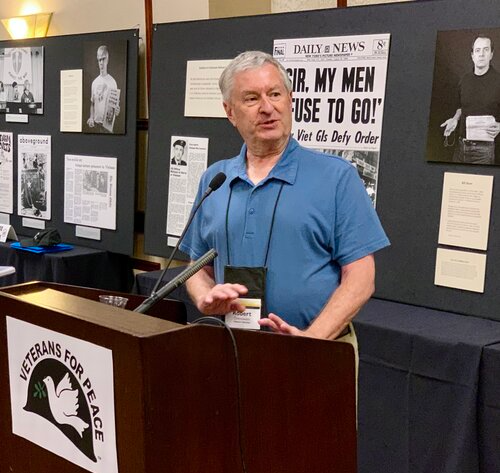
Higher ranking POWs responded by trying to isolate the dissenters from other American prisoners while charging them with participating in a conspiracy against the United States.
One of the dissidents, Abel Kavanaugh, committed suicide as a result of the intense pressure and prospective stigma of a dishonorable discharge only a few months after coming home from Vietnam.
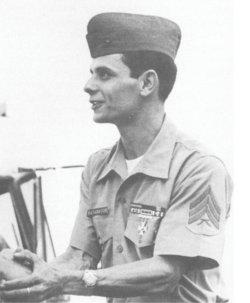
Charges against the POW dissidents were eventually dropped, Wilber and Lembcke believe, so as to not jeopardize the hero-prisoner story with too much attention on dissent and through a possible exposure of inconsistencies in the accusers’ own prison biographies.
Fear of Communist Infiltration
A critical trope in Cold War America was the fear of communist infiltration and internal subversion through brainwashing and mind control.
This trope was fortified by a CIA propaganda effort that depicted Korean War POWs who defected to the North Korean and Chinese side as having been brainwashed in interrogation.
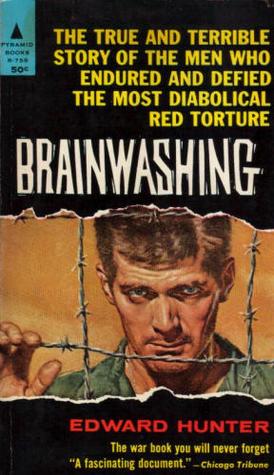
Many of these defectors were in fact African-Americans who did not want to return to the Jim Crow South, while others were attracted by communist ideals or saw the U.S. war as immoral.[1]
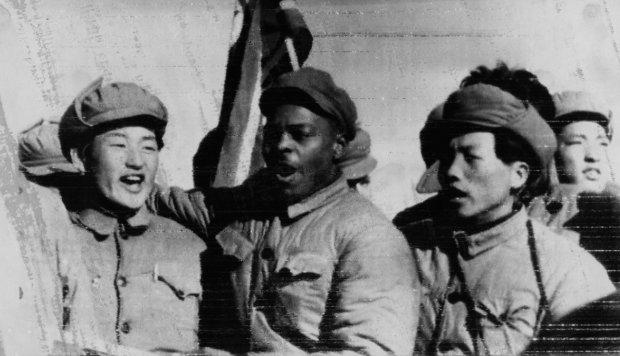
The stereotype of the brainwashed POW of the Korean War turned collaborator and traitor because of his weak character would become the backdrop for the discrediting of the dissident POWs of the Vietnam War.
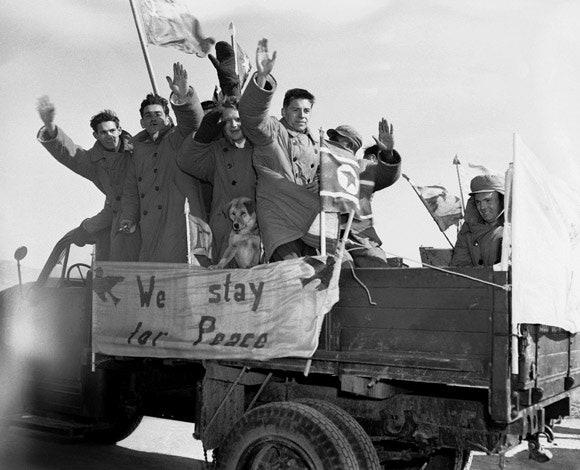
In an appearance on CBS’s 60 Minutes, Gene Wilber was grilled on whether he had given in to the enemy to make antiwar statements. That he had acted on his own “conscience and morality” was drowned out by host Mike Wallace’s implications of collaboration and opportunism.
When he was subsequently invited to the White House POW reception, Wilber found his hotel room broken into and marked with accusations of treason when he returned from the reception.
In the summer of 1973, James Stockdale charged Wilber and Edison Miller with collaborating with the enemy, mutiny, and inciting personnel to insubordination. However, military judges found insufficient evidence to prosecute the case, and Wilber and Miller instead received letters of censure for their failure to meet the standard expected of officers.
Hollywood Revisionism
POW films starting from this time focused on returnees’ estrangement with their families and society and were told as stories of spousal infidelity, representing both individual drama as well as a sense of “home-front betrayal.”
These films were part of a post-war revisionism, which included a spate of films that contributed to the legend of American servicemen left behind in Vietnam.
In the 1980s, a new subgenre emerged focused on Vietnam veterans heroically taking on the task of returning to Indochina and liberating the left-behind POWs, who had been betrayed on the home front and abandoned by the U.S. government.
The POWs were depicted as victimized and emasculated captives who needed to be rescued by individualist heroes and whose honor as Americans was to be restored.
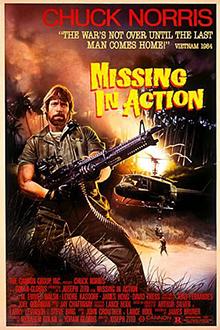
This image, Wilber and Lembcke argue, fits the post-war efforts to psychologize the once political conflicts of the Vietnam War and to depict the veteran as a victim and loser.
More of a heroized image and the POWs’ endurance of torture was revived with the 1987 film, The Hanoi Hilton, which starred Michael Moriarty, Ken Wright and Paul Le Mat as U.S. POWs who defy their captors while enduring brutal treatment at Hanoi’s Hoa Lo prison (aka The Hanoi Hilton).
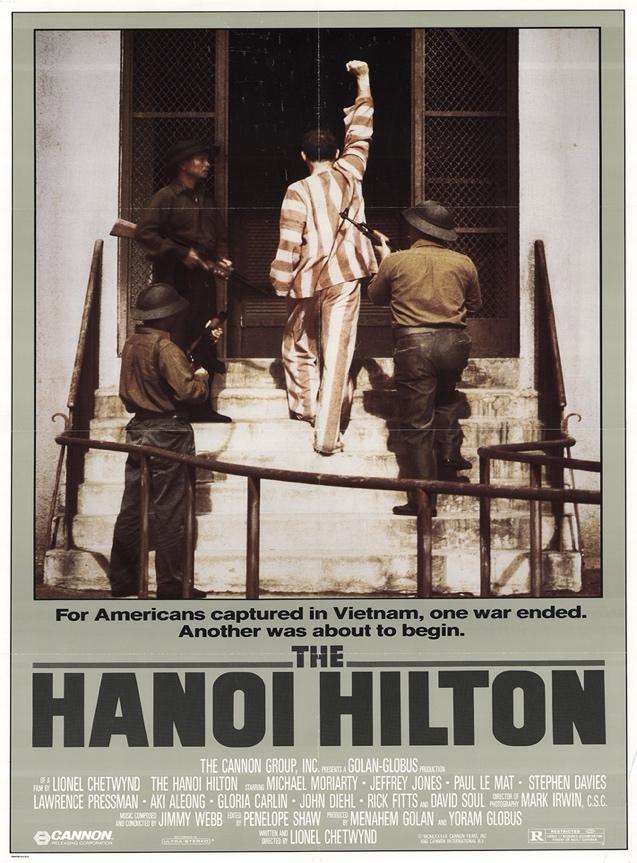
This film meshed particularly well President’s Ronald Reagan’s characterization of the Vietnam War as a “noble cause,” fought by noble men, with the POW dissenters by implication being ignoble.
Persistence of the Hero-Prisoner Story
In their quest to comprehend the persistence of the hero-prisoner story, Wilber and Lembcke take their readers back to American colonial history and the captivity narratives emerging during that time.
These stories are about a complex mix of violence against captives, temptations to stay with their captors, the ideal to remain loyal with their fellow colonists, and their Christian beliefs.
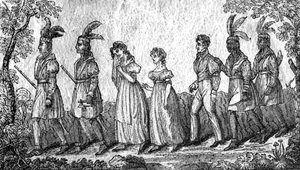
Such tensions and correlations between the Self and the Other were critical in the making of an American identity. The wars in Korea and Vietnam and the POW experiences there can be understood as a new chapter of this identity-making process. Here, too, Americans must prove their will and ability to endure the brutality of a racialized Other.
A wrench in the story, however, is revealed in the autobiographical accounts of POW-heroes like Stockdale, Denton, and Risner. They wrote about fasting as a way of enforcing self-discipline and self-assurance, sometimes with a religious subtext.
More bizarrely, they also wrote about self-mutilation—the deliberate infliction of physical wounds on themselves that would be visible during filmed interviews.
The aim was to make it appear to other POWs (and to the U.S. public) that they had been tortured. One officer wrote of how he purposely damaged his vocal apparatus so he could not be forced to make propaganda statements.
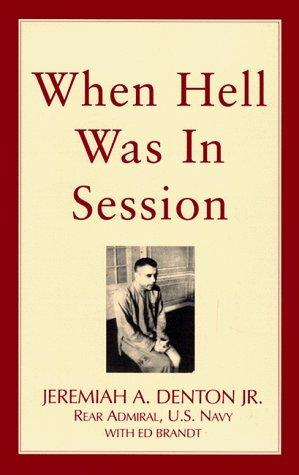
[Source: goodreads.com] 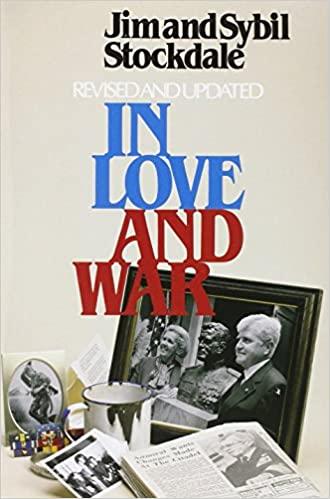
[Source: amazon.com] 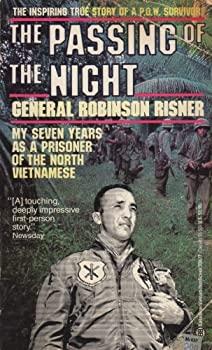
[Source: thriftbooks.com]
In addition to some high-ranking officers attempting to portray themselves as heroes by means of self-mutilation, Wilber and Lembcke also noted that they tried to keep political literature and news of dissent back home away from other POWs, fearing that these would enhance critical positions on the war and against their authority within the prison population.
Moreover, these officers often despised the more humane view of the Vietnamese displayed by other prisoners, including an interest in their language and culture, and an understanding of why they were fighting back against an invasion of their country by the most powerful military force in the world.
Bringing Back Forgotten Dissenters
Wilber and Lembcke’s book helps restore these forgotten POW dissenters to their rightful—and honored—place among the large and diverse Vietnam generation of dissidents, draft resisters, oppositional GIs, veteran activists, deserters, and all those who supported them.
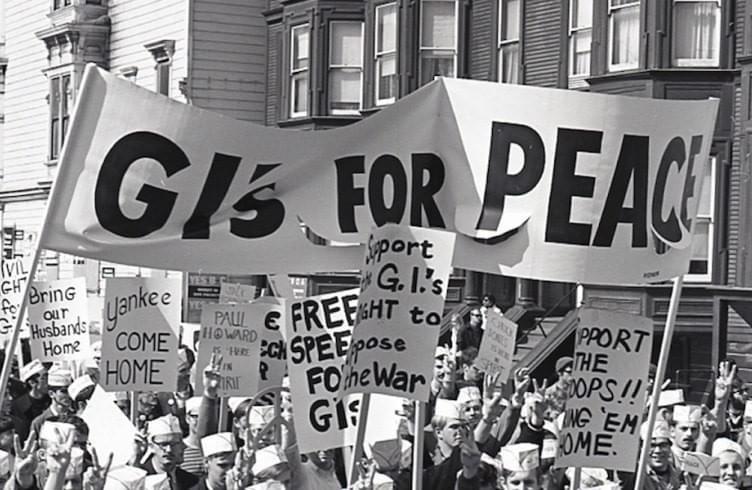
The book also shows that, despite all destruction and death brought by the invaders from the sky, North Vietnam maintained a moral superiority through oftentimes fair treatment of the captured Americans. This was in stark contrast to the more systematic adoption of torture methods by USAID and CIA-trained police under the Operation Phoenix and like-minded programs.
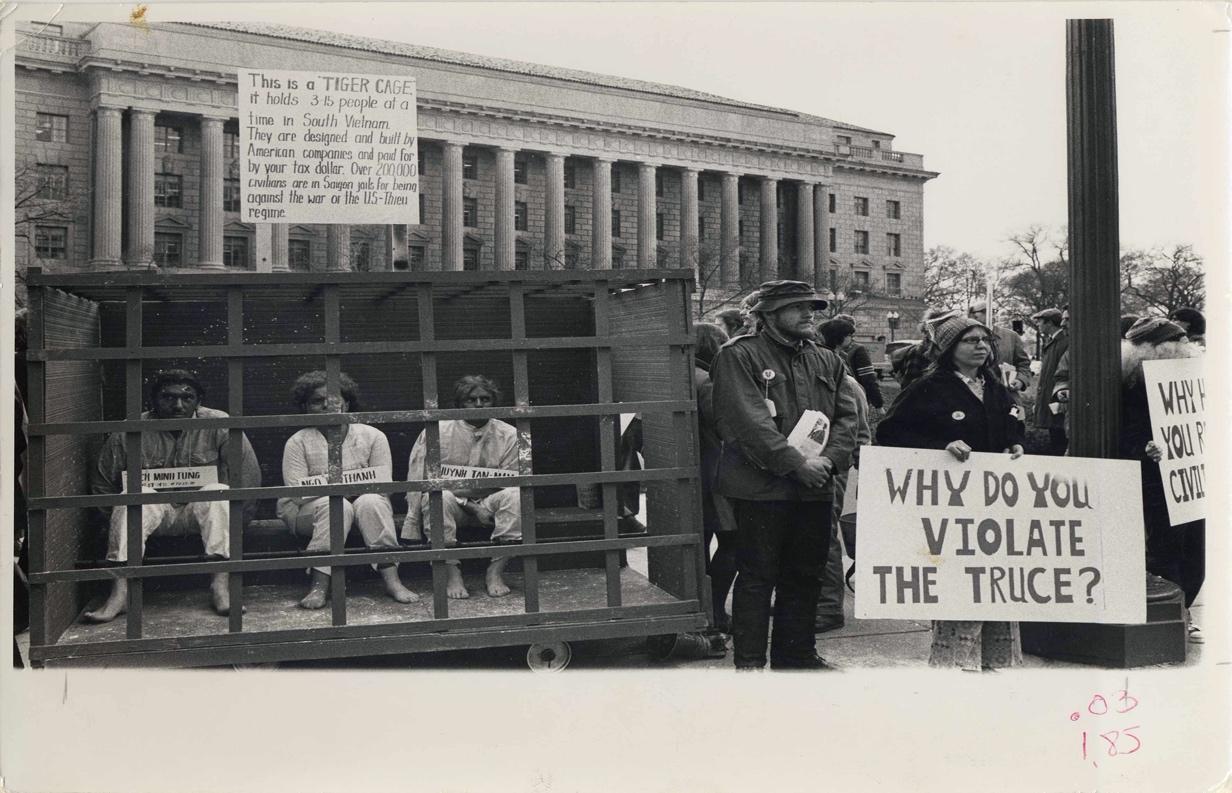
The POW/MIA flag that flies today over the White House is intended to honor the men who endured captivity; however, it continues to perpetuate a distorted understanding of a war that was as abominable as it was unjust, and helps to advance a dangerous nationalist ideology that may lead to future Vietnams.

-
See Clarence Adams, An American Dream: The Life of an African American Soldier and POW Who Spent Twelve Years in Communist China (Amherst, MA: University of Massachusetts Press, 2007). ↑
CovertAction Magazine is made possible by subscriptions, orders and donations from readers like you.
Blow the Whistle on U.S. Imperialism
Click the whistle and donate
When you donate to CovertAction Magazine, you are supporting investigative journalism. Your contributions go directly to supporting the development, production, editing, and dissemination of the Magazine.
CovertAction Magazine does not receive corporate or government sponsorship. Yet, we hold a steadfast commitment to providing compensation for writers, editorial and technical support. Your support helps facilitate this compensation as well as increase the caliber of this work.
Please make a donation by clicking on the donate logo above and enter the amount and your credit or debit card information.
CovertAction Institute, Inc. (CAI) is a 501(c)(3) non-profit organization and your gift is tax-deductible for federal income purposes. CAI’s tax-exempt ID number is 87-2461683.
We sincerely thank you for your support.
Disclaimer: The contents of this article are the sole responsibility of the author(s). CovertAction Institute, Inc. (CAI), including its Board of Directors (BD), Editorial Board (EB), Advisory Board (AB), staff, volunteers and its projects (including CovertAction Magazine) are not responsible for any inaccurate or incorrect statement in this article. This article also does not necessarily represent the views the BD, the EB, the AB, staff, volunteers, or any members of its projects.
Differing viewpoints: CAM publishes articles with differing viewpoints in an effort to nurture vibrant debate and thoughtful critical analysis. Feel free to comment on the articles in the comment section and/or send your letters to the Editors, which we will publish in the Letters column.
Copyrighted Material: This web site may contain copyrighted material the use of which has not always been specifically authorized by the copyright owner. As a not-for-profit charitable organization incorporated in the State of New York, we are making such material available in an effort to advance the understanding of humanity’s problems and hopefully to help find solutions for those problems. We believe this constitutes a ‘fair use’ of any such copyrighted material as provided for in section 107 of the US Copyright Law. You can read more about ‘fair use’ and US Copyright Law at the Legal Information Institute of Cornell Law School.
Republishing: CovertAction Magazine (CAM) grants permission to cross-post CAM articles on not-for-profit community internet sites as long as the source is acknowledged together with a hyperlink to the original CovertAction Magazine article. Also, kindly let us know at info@CovertActionMagazine.com. For publication of CAM articles in print or other forms including commercial internet sites, contact: info@CovertActionMagazine.com.
By using this site, you agree to these terms above.
About the Author
Paul Benedikt Glatz is the author of Vietnam’s Prodigal Heroes: American Deserters, International Protest, European Exile, and Amnesty (Lexington Books, 2021).
Jeremy Kuzmarov
Steve Brown
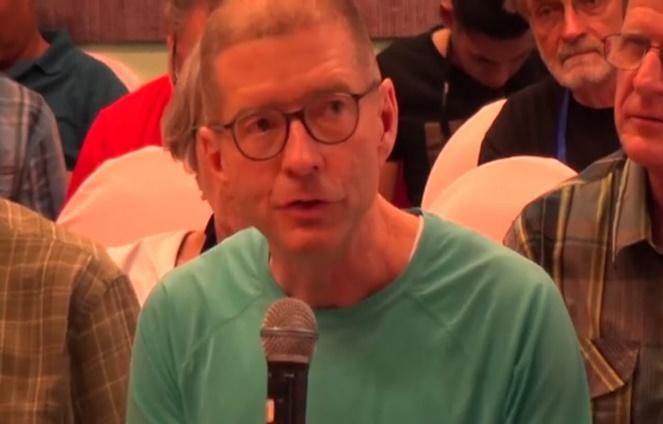
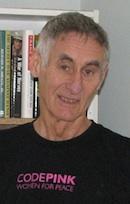

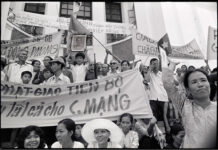
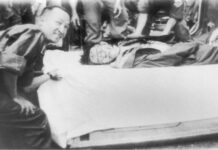


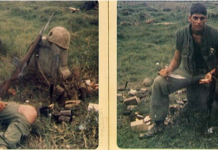
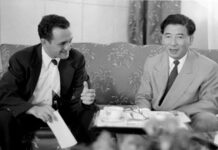
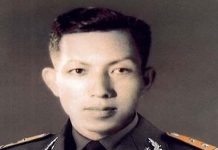
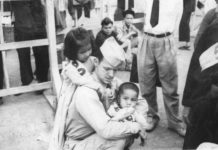

[…] The CIA subsequently supported the 2012 film Zero Dark Thirty dramatizing the hunt for Osama bin Laden, which went too far for even a rabid war hawk like John McCain (R-AZ), who repudiated torture following his own alleged experience being tortured in the Vietnam War. […]
[…] daha sonra, Vietnam Savaşı’nda işkence gördüğü iddia edilen kendi deneyiminin ardından işkenceyi reddeden John McCain (R-AZ) gibi kuduz bir savaş şahini için bile çok […]
[…] The CIA subsequently supported the 2012 film Zero Dark Thirty dramatizing the hunt for Osama bin Laden, which went too far for even a rabid war hawk like John McCain (R-AZ), who repudiated torture following his own alleged experience being tortured in the Vietnam War. […]
[…] The CIA subsequently supported the 2012 film Zero Dark Thirty dramatizing the hunt for Osama bin Laden, which went too far for even a rabid war hawk like John McCain (R-AZ), who repudiated torture following his own alleged experience being tortured in the Vietnam War. […]
I personally listened to Radio Hanoi live on shortwave radio around Christmas 1971 to John McCain being interviewed and stating that he was a war criminal and the American military was there illegally. The interview lasted a few minutes, and I believe was heard by very few in the states.
Hamburgertime seems to like him some Iranian terrorists that are constantly talking about annihilating the U.S.A. . . .
[…] Magazine reports “New Evidence Reveals That Senator John McCain and Other High-Ranking Vietnam War POWs May Have Li…June 21, 2021. This article is intriguing since it documents a much different narrative about the […]
My father was in Vietnam before the war. He was captured by the Vietnamese, and held and tortured, raped sadistically in a cage for 49 days. He was finally freed. There was some talk (not sure if true) about getting an hour with the torturer before cutting off ears and bringing them home. Took years before they could let it go enough to bury the ears in the backyard. Flashbacks as an old man. The Vietnamese did torture. My father got nothing extra out of the story; he probably told to no one else. War is hell, there was no ‘nice side” There were atrocities on both sides.
Anecdotes, by family members or others, are not evidence. Why would the Vietnamese do this to a captured soldier? They would gain nothing from it.
Why would the Vietnam war ever occur at all? Neither side would gain nothing from it. Hence, using your logic, there never was a Vietnam war. All those stories of family members coming home in body bags are anecdotal.
[…] Magazine reports “New Evidence Reveals That Senator John McCain and Other High-Ranking Vietnam War POWs May Have Li…June 21, 2021. This article is intriguing since it documents a much different narrative about the […]
[…] Magazine reports “New Evidence Reveals That Senator John McCain and Other High-Ranking Vietnam War POWs May Have Li…June 21, 2021. This article is intriguing since it documents a much different narrative about the […]
[…] Covert Action Magazine | Original […]
[…] By Paul Benedikt Glatz, Jeremy Kuzmarov and Steve Brown at Covert Action Magazine […]
More insight about this topic:
https://www.youtube.com/watch?v=XIVVErwY7Zs
[…] Most of these defectors were in fact African-Americans who did not want to return to the Jim Crow South, while others were attracted by communist ideals or saw the U.S. war as immoral.[1] […]
[…] By Paul Benedikt Glatz, Jeremy Kuzmarov and Steve Brown | Covert Action Magazine | June 21, 2021 […]
[…] New Evidence Reveals That Senator John McCain and Other High-Ranking Vietnam War POWs May Have Lied … […]
LMAO
This is why they call him “No Name”
Excellent and informative article. Wondering about the widely repeated and accepted claims that returning Vietnam vets were routinely “spit on”, verbally abused, etc. I was avidly antiwar and never witnessed any behavior of this type. Also a myth?
See Jerry Lembcke’s book, “The Spitting Image,” for your answer. This book, “Dissenting POWs,” follows up on some of its threads.
Have you watched “Sir No Sir”? Terrific film and if you rent the DVD you get lots of extras.
Those privileged Americans have no soul and only represent others of privilege taking, destroying and spreading propaganda. Our present day mess off a world from their legacy cannot take much more abuse.
Thanks for a great artical on the Truth about Nam and Amerikas fake propaganda
[…] Paul Benedikt Glatz, publicado en Cover Action Magazine, EE.UU. Entre los pocos recuerdos que la mayoría de los estadounidenses aún conservan de la […]
I agree that the Vietnamese war was a terrible mistake that should never have happened. But let’s not spread a false narrative that the POWS were well treated while in prison. A little bit of common sense never hurt anybody.
A mistake? A mistake? What a dangerous and naive ideology. The wars the U.S. has engaged in during its entire existence are not mistakes. We have engaged in genocide to steal the land and resources from the people who already lived here, then we took on the world with the same mentality. No mistake in the horrors we perpetrated in Vietnam, just more of the same colonialism we are still practicing today. What do you think life was like for Vietnamese people? Soldiers protected American POWs from the wrath of ordinary Vietnamese who, needless to say, wanted to kill the people who were bombing them. And if the POWs ate the same food as their Vietnamese captors, so bloody what? I have far more faith in the decency of the Vietnamese than I have for this horrific, violent, and bankrupt nation.
[…] by Paul Benedikt Glatz CovertAction Magazine […]
U.S. prisoners of war in North Vietnam were subjected to extreme torture and malnutrition during their captivity. Although North Vietnam was a signatory of the Third Geneva Convention of 1949,[9] which demanded “decent and humane treatment” of prisoners of war, severe torture methods were employed, such as waterboarding, strappado (known as “the ropes” to POWs),[10] irons, beatings, and prolonged solitary confinement.[9][11][12] The aim of the torture was usually not acquiring military information.[11] Rather, it was to break the will of the prisoners, both individually and as a group.[11][13] The goal of the North Vietnamese was to get written or recorded statements from the prisoners that criticized U.S. conduct of the war and praised how the North Vietnamese treated them.[11] Such POW statements would be viewed as a propaganda victory in the battle to sway world and U.S. domestic opinion against the U.S. war effort.[11][14]
During one such event in 1966, then-Commander Jeremiah Denton, a captured Navy pilot, was forced to appear at a televised press conference, where he famously blinked the word “T-O-R-T-U-R-E” with his eyes in Morse code, confirming to U.S. intelligence that U.S. prisoners were being harshly treated. Two months later, in what became known as the Hanoi March, 52 American prisoners of war were paraded through the streets of Hanoi before thousands of North Vietnamese civilians. The march soon deteriorated into near riot conditions, with North Vietnamese civilians beating the POWs along the 2 miles (3.2 km) route and their guards largely unable to restrain the attacks.[15]
If you believe what you wrote, you really need to learn how the US-dominated world works.
One may not support John McCain’s political views, But John McCain would never lie about being tortured.
He is not the type of man who do something like that. I trust him in this regard.
When you repeat lies to yourself often enough, you come to believe them. John McCain was a war criminal who continued his war criminality as a senator. He was a self-promoter, and self-promoters will say anything to advance their hunger for power and money. And it’s fascinating how you quote the very man the article does not exactly hold up as an admirable human being. I assume you are a troll working for the CIA in one of its many guises.
No. I do not work for the CIA. I am not very interested in politics.I am just a person expressing an opinion. I will now do some Tai Chi so I can feel more calm and peaceful
Your faith in the moral integrity of a man who unabashedly sang “Bomb bomb Iran” at a campaign appearance is unfortunately emblematic of the apathy, intellectual torpor, and cognitive dissonance which dominates the American psyche. So is your comment about your appropriation of Tai Chi.
I did not say very much about John McCain. I merely said that I do not think he was lying about being tortured. It is true that I do not feel as negatively about him as you do, but I was only talking about one specific thing.
I am a person is is often afraid and nervous about expressing my opinion for fear of how people will react, so I tend to keep my comments short and simple and not say too much. I speak honestly and say what I feel is truthful.
Virtually all innovation is based to a certain extent upon the appropriation of the work of others. The scientific revolution was appropriated from the works of the Greeks by way of the Arabs. Marxism was appropriated from Hegal. Our alphabet was appropriated from the Lebanese, our number system from the Arabs, the number of zero from the Indians. The American Industrial Revolution was appropriated from the British, the Chinese from the Americans. So what. We all do it and will keep doing it for all time. If that offends anyone they are welcome to take offense. After all, taking offense was probably appropriated from the Whites.
Maybe McCain was tired of the rhetoric coming out of Iran about annihilating the U.S.A. etc.
Use of ad hominem attacks is virtually a concession that your argument has no merit. And I find it fascinating that you believe without questioning anything that is written in an article, and criticize anyone who has the audacity to question it. After all, its on the internet so it must be true.
Many sites I follow contain comments from people who at best are gullible and at worst trolls. Does the commenter personally know that John McCain would never lie? How can one state that about anyone? I already knew some of the information contained in this article and I have no problem believing this additional information. I have found CAM to be a very reliable source; it’s not exactly Fox News or PBS.
I was living in San Francisco when the former commandant of the Hanoi Hilton visited the West Coast. I cheery, wiry little man, he laughed uproariously when asked about torturing McCain. “Torture him? We worshipped him! He was our most valuable prisoner! The son of the US Pacific CinC was a genuine prince. We took much better care of him than ourselves. He was the only leverage we had”.
Just as William Colby would never lie about torturing prisoners during the Phoenix campaign, so I am sure this commandant would not have lied also even though, unlike Mr. Colby, he was not under oath.
Surely, like all the wars since the USA “won” WW2, the USA should not have been in Vietnam and would have lost NO military personnel or had any taken prisoner had they stayed at home and tried to improve their own homeland, not destroy others.
The US has not won a war without Russia/Soviet Union as an ally for over 100 years. They spent the past 20 years having their asses handed to them by the Taliban. US Politicians become millionaires from their personal Investments in the same corporations they hand billion dollar NO BID CONTRACTS to every year.. The more they can privatise war, the more money they make. There is no profit in peace.
According to Amnesty International, as of 2018 “There are at least 97 prisoners of conscience languishing in jails in Vietnam, many of whom are kept incommunicado in squalid conditions and routinely subjected to torture or other ill-treatment,”. How ironic that the Vietnamese communists refrained from torturing the people who were bombing their country in the midst of a fight for there very existence, but 50 years later, amidst unprecedent peace and prosperity, it has now taken to torturing mere dissidents.
The author’s claim that Operation Phoenix engaged in systematic torture must be false since William Colby repeatedly deny it, and, of course, like Nguyen Tien Tran, Mr. Colby surely would have admitted such allegations if they were true.